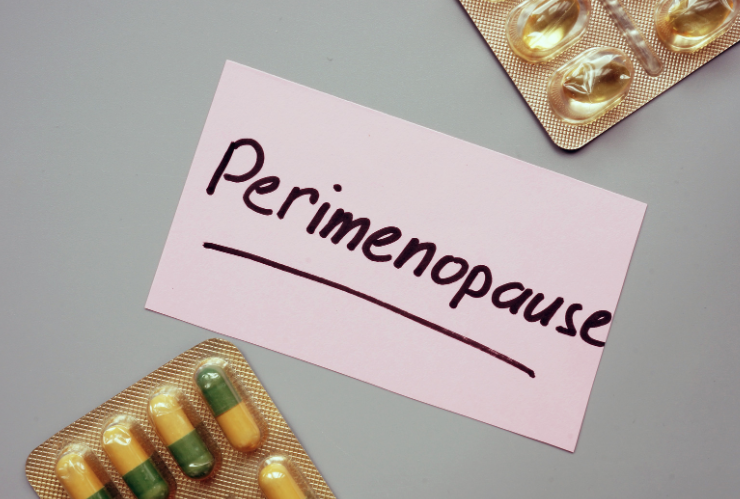Symptoms of Perimenopause and Why You Shouldn’t Ignore Them

If you’re in your late 40s or early 50s, you may begin experiencing symptoms of perimenopause, the lead up to menopause. Menopause is marked by the absence of menstrual periods for a full year. Perimenopause can last for months or years as hormones change. The process of menopause typically takes place from age 40 to age 60, although the average age of menopause is 51, according to The Mayo Clinic. Premature menopause can occur before age 40.
Our previous blog post provided an overview of perimenopause. Now, we would like to share more detail about the symptoms of perimenopause and talk about why you shouldn’t ignore these issues. Many of these symptoms can be treated or addressed so the symptoms don’t get in the way of your lifestyle.
Symptoms Vary from Woman to Woman
Perimenopause symptoms range from the expected changes in your menstrual cycle to increased anxiety and depression. The medical community has learned a lot about menopause over the years since your mother or grandmother went through it, however, symptoms can vary drastically from one woman to another. Some women have severe symptoms, while others seem to have none.
During perimenopause, the body is gradually adjusting to reduced estrogen levels. Your ovaries release eggs less regularly as you become less fertile. Eventually ovulation stops, but for 2 to 10 years, your periods can become irregular, and you can experience other changes.
What we’d like you to know is that many of these symptoms can be treated with bioidentical hormonal therapy. Patients of Infinity Medical Clinic have found that the creams that are produced specifically for their body chemistry can provide great relief when struggling with weight gain, anxiety, depression, sleep disruptions, loss of libido and more. Learn more about perimenopause treatment
Symptoms of Perimenopause
Irregular periods
The common path for all women experiencing perimenopause is the gradual loss of their menstrual cycle as the ovaries shut down. Eventually, periods will stop completely. Until then, your periods can be closer together or further apart, extra heavy or extra light, or longer or shorter. You may skip a period and think you are in menopause, but you may still be able to get pregnant. You are not officially in menopause until you have skipped 12 months of periods.
Vaginal Dryness
A very common issue during perimenopause and menopause is vaginal dryness. As the vaginal tissues become thinner and have less natural moisture, sex can become uncomfortable. The urinary tract may also be affected, which can lead to more urinary tract infections.
Loss of Libido
Some women have a loss of libido when in perimenopause. This could be related to hormonal changes that change the sensation and natural lubrication of the vaginal tissue.
Sleep Disruptions
Research continues to show the importance of sleep to our health and well-being. Unfortunately, the hormonal shifts that take place in perimenopause often cause insomnia. This can create a vicious cycle of not sleeping at night and feeling tired during the day.
Too Hot or Too Cold
Most people associate menopause with hot flashes, but those are usually reserved for the late stages of perimenopause. More often, women feel warm or get chills during this stage of life. Night sweats are among the symptoms everyone should pay attention to, as they may be associated with very serious illnesses and not just menopause.
Hair and Skin Changes
As hormones change, the hair and skin often change, too. These changes can be temporary or permanent. For example, some minor hair loss or thinning of the hair can take place. The skin often changes, becoming dry or causing blemishes as the hormones fluctuate.
Anxious or Depressed
Changes in the chemistry of the brain also take place during perimenopause. This can trigger anxiety and depression, forgetfulness, or lack of attention. Fortunately, women don’t have to suffer from anxiety attacks or bouts of depression. Today’s treatments are effective in balancing mood and helping the brain function better.
Weight Gain
Many women find that gaining weight is much easier during perimenopause. The metabolism shifts along with the hormones. Dietary modifications, such as smaller meals and portions, may help avoid excess weight.
When to See Your Doctor
Dr. Stemmerman encourages women to address any symptoms of perimenopause that interfere with your daily life or sex life. That includes lack of sleep, change in mood, weight gain, loss of interest in sex. Dr. Stemmerman can examine you, talk to you about your symptoms, and create a plan with you to test your hormonal levels and treat your specific symptoms. Contact Infinity Medical Clinic for an appointment to address the challenges of perimenopause, so you can continue an active and healthy lifestyle with fewer disruptions from these symptoms!


